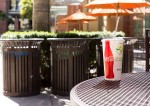Takeout is great. The only problem is what you do once it’s taken out.
Takeout options offered by UCLA Dining Services allow students to eat on the go when other options are unavailable. Popular locations, such as Rendezvous and The Study at Hedrick, however, produce a notable amount of waste because of their use of disposable containers and utensils.
UCLA recently switched to compostable and recyclable disposables at takeout facilities to reduce that. But the new sustainable items will only divert waste from landfills if students actually toss them into the right waste bins.
UCLA has a responsibility to ensure its new sustainable disposables actually lead to less waste in dining and takeout facilities. For many students, proper waste disposal is a mystery that few have the time or care to solve. The administration needs to better demarcate waste labels so consumers know where to dispose of their trash without substantial effort.
Students are largely unaware that almost all of the food containers and utensils provided at UCLA Dining Services facilities, such as the Study and Rendezvous, can be composted or recycled. For example, Andrew Guerrero, a fourth-year international development studies student, said he had no idea waste from Rendezvous was compostable.
Even when students are aware their food containers should not be put in trash bins, they do not always know which bin corresponds to which kind of waste. Some materials seem to contradict the conventional rules for sorting trash, which can be especially confusing. Many plastics used on campus are compostable and not to be recycled, but most Bruins tend to toss their plastic waste into recycling bins.
Bonnie Bentzin, UCLA’s deputy chief sustainability officer, said the university has considered transitioning away from its compostable plastics because many find it difficult to separate the different types of plastics used on campus.
“I try to educate people to be aware that compostable plastics are on campus and to look for the PLA,” Bentzin said, referring to the label for items made of polylactic acid, a biodegradable compound.
But these labels are useful only if consumers understand them. Using abbreviations like “PLA” and “BPI” or relying on numbers that correspond to specific material compositions are not good ways to encourage universal participation in the campus’ sustainability efforts.
Kei Hagiwara, a second-year physics student, had not heard of PLA and said he thought it was a label for recyclables.
Some labels on takeout items are certainly clearer than others. The labels on cups are rather obvious, depicting green leaves with text telling you to compost the waste. The lids, however, are simply labeled PLA-7, which is unclear, to say the least. The straws, which are also biodegradable, aren’t labeled at all. Because of UCLA’s sporadic labeling, improper disposal is all too probable.
One strategy to make it easier to separate trash is to limit the types of waste bins on the premises. UCLA Dining Services, for instance, only places compost and recycling bins at Rendezvous, since the majority of the items are compostable and the rest recyclable.
But while this clever placement of bins can lead to more trash ending up in the right place, many consume their takeout food elsewhere and throw the compostables in trash or recycling bins because there aren’t compost bins nearby. Dorm rooms, for example, are often not equipped with compost bins.
The key to solving this is simplicity. Current labels are not user-friendly, and UCLA should make an effort to label items in a comprehensible manner. Vividly colored labels coded to match the colors on corresponding waste bins would be one way to achieve this. Since UCLA has adopted single-stream recycling and composting bins that allow different materials such as papers and metals to be disposed into one bin, any label more complicated than “recyclable” or “compostable” is not necessary.
Furthermore, UCLA should work to make consumers aware that the disposables it uses are compostable and recyclable. Dining can place large signs near entrances and menus and train employees to recite a short message reminding consumers where to put their trash, similar to how they ask whether you would like a fountain drink with every order.
Students should not be forced to seek out the proper method for disposing their trash; instead, UCLA should have a system that makes these decisions second nature.
Half the battle is already won, UCLA. Our disposables are more sustainable. The bins are in place. Let’s not miss the open dunk.
